Thought of the Day

Optimism is a happiness magnet.


Optimism is a happiness magnet.
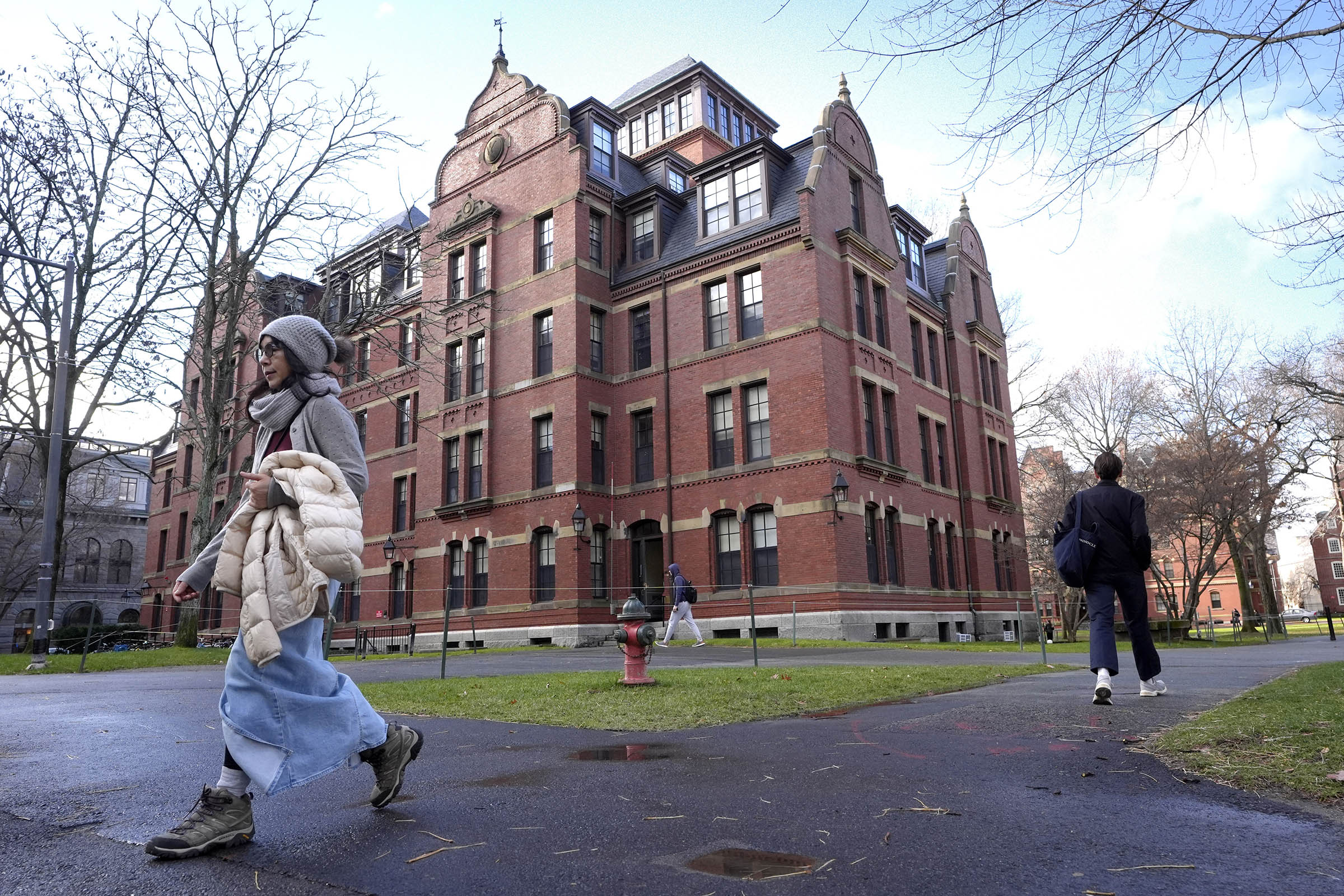
By COLLIN BINKLEY and MICHAEL CASEY Associated Press
BOSTON (AP) — A federal judge in Boston on Wednesday ordered the Trump administration to reverse its cuts of more than $2.6 billion in research funding for Harvard University, delivering a significant victory to the Ivy League school in its battle with the White House.
U.S. District Judge Allison Burroughs ruled the cuts amounted to illegal retaliation for Harvard’s rejection of the Trump administration’s demands for changes to Harvard’s governance and policies.
The government had tied the funding freezes to Harvard’s delays in dealing with antisemitism, but the judge said the university’s federally backed research had little connection to discrimination against Jews.
“A review of the administrative record makes it difficult to conclude anything other than that (the government) used antisemitism as a smokescreen for a targeted, ideologically-motivated assault on this country’s premier universities,” Burroughs wrote. The country must fight antisemitism, she wrote, but it also must protect the right to free speech.
The ruling reverses a series of funding freezes that later became outright cuts as the Trump administration escalated its fight with the nation’s wealthiest university. The administration also has sought to prevent the school from hosting foreign students and threatened to revoke its tax-exempt status in a clash watched widely across higher education.
The restoration of federal money would revive Harvard’s sprawling research operation and hundreds of projects that sustained cuts. But whether Harvard actually receives the federal money remains to be seen. The government plans an immediate appeal, White House spokeswoman Liz Huston said in a statement, calling Burroughs an “activist Obama-appointed judge.”
“To any fair-minded observer, it is clear that Harvard University failed to protect their students from harassment and allowed discrimination to plague their campus for years,” Huston said. “Harvard does not have a constitutional right to taxpayer dollars.”
Harvard President Alan Garber foreshadowed potential battles to come even as he said the ruling validates Harvard’s fight for academic freedom.
“Even as we acknowledge the important principles affirmed in today’s ruling, we will continue to assess the implications of the opinion, monitor further legal developments, and be mindful of the changing landscape in which we seek to fulfill our mission,” Garber wrote in a campus message.
Harvard’s research scientists said they had been watching the case closely but feared their funding would not be restored anytime soon.
“Many of us are worried that the federal government is going to appeal this decision or find other ways to obstruct the delivery of research dollars, despite the judge’s clear statement that the funding terminations were illegal,” said Rita Hamad, director of a center that researches the impact of social policies on health.
Beyond the courthouse, the Trump administration and Harvard officials have been discussing a potential agreement that would end investigations and allow the university to regain access to federal funding. President Donald Trump has said he wants Harvard to pay no less than $500 million, but no deal has materialized, even as the administration has struck agreements with Columbia and Brown.
Wednesday’s federal court ruling should embolden Harvard’s administration, said historian Kirsten Weld, president of Harvard’s chapter of the American Association of University Professors, which also prevailed in a lawsuit over the funding cuts. “We hope this decision makes clear to Harvard’s administration that bargaining the Harvard community’s rights away in a compromise with the government is unacceptable,” Weld said.
Harvard’s lawsuit accused the Trump administration of waging a retaliation campaign against the university after it rejected a series of demands in an April 11 letter from a federal antisemitism task force.
The letter demanded sweeping changes related to campus protests, academics and admissions. It was meant to address government accusations that the university had become a hotbed of liberalism and tolerated anti-Jewish harassment on campus.
Harvard President Alan Garber pledged to fight antisemitism. But, he said, no government “should dictate what private universities can teach, whom they can admit and hire, and which areas of study and inquiry they can pursue.”
Trump officials moved to freeze $2.2 billion in research grants the same day Harvard rejected the administration’s demands. Education Secretary Linda McMahon declared in May that Harvard would no longer be eligible for new grants, and weeks later, the administration began canceling contracts with Harvard.
As Harvard fought the funding freeze in court, individual agencies began sending letters announcing that the frozen research grants were being terminated under a clause allowing grants to be scrapped if they no longer align with government policies. Harvard has moved to self-fund some of its research but warned it can’t absorb the full cost of the federal cuts.
The judge’s order reverses all of Harvard’s federal funding freezes and cuts since April 14, and it bars the government from future cuts that violate Harvard’s constitutional rights or run afoul of federal law.
Burroughs sided with the university’s argument that the cuts amounted to retaliation in violation of its First Amendment rights and that the government put unconstitutional conditions on Harvard’s federal money.
“As pertains to this case, it is important to recognize and remember that if speech can be curtailed in the name of the Jewish people today, then just as easily the speech of the Jews (and anyone else) can be curtailed when the political winds change direction,” the judge wrote.
Burroughs also agreed with Harvard’s claim that the government failed to follow steps prescribed by Congress to cut federal money under Title VI of the Higher Education Act, a federal law that forbids discrimination in education.
The Trump administration denied the cuts were made in retaliation, saying the grants were under review even before the April demand letter was sent. It argues the government has wide discretion to cancel contracts for policy reasons.
“It is the policy of the United States under the Trump Administration not to fund institutions that fail to adequately address antisemitism in their programs,” it said in court documents.
In a separate lawsuit filed by Harvard, Burroughs previously blocked the Trump administration’s efforts to prevent the school from hosting international students.
___
Binkley reported from Washington, D.C. AP reporter Aamer Madhani contributed from Washington.
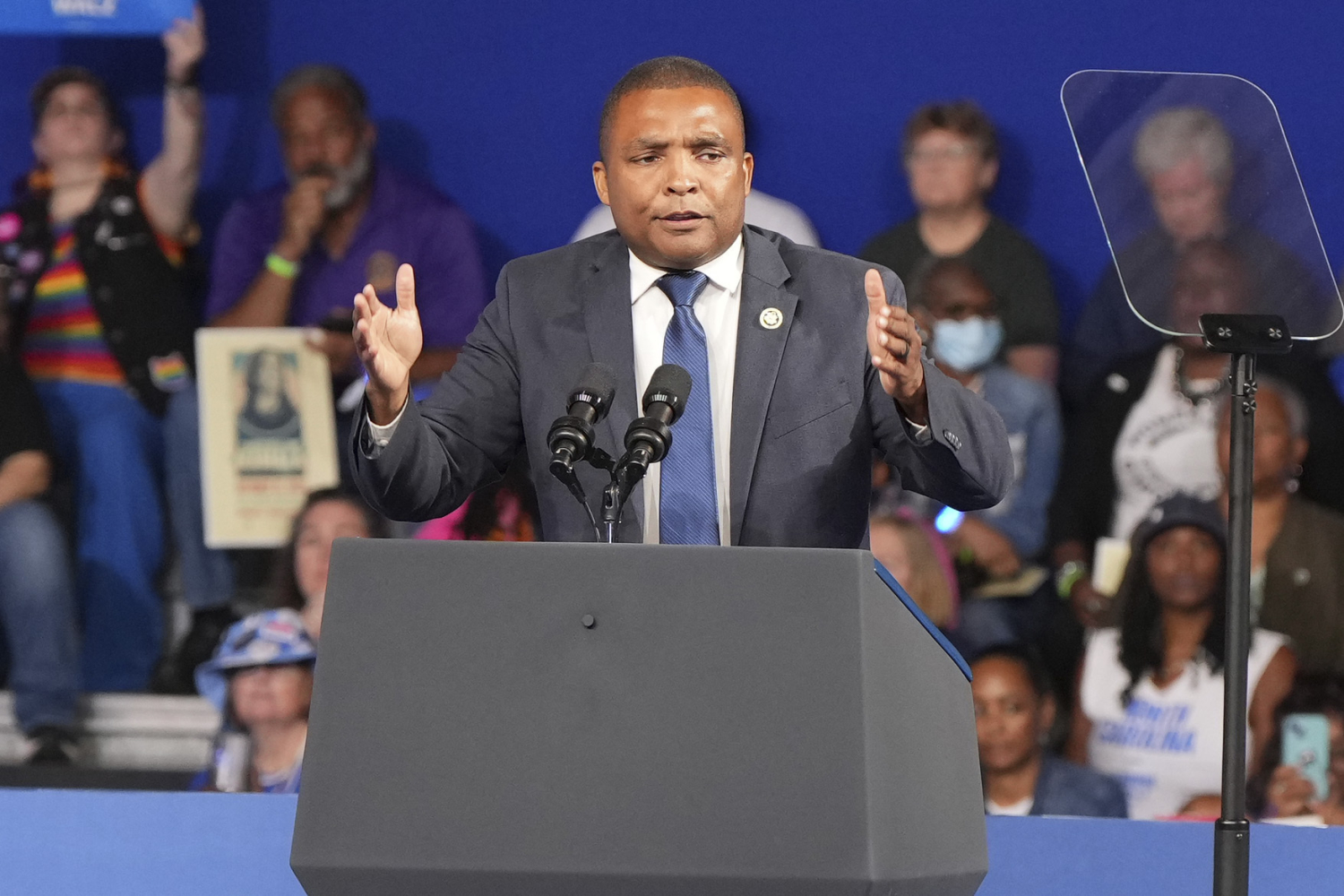
POWELLS POINT, N.C. (AP) — A coastal North Carolina legislator announced his bid on Wednesday for a U.S. House seat next year, looking to unseat Democratic incumbent Don Davis in what is now the state’s currently only swing congressional district.
State Sen. Bobby Hanig of Currituck County said he would seek the Republican nomination for the sprawling 1st Congressional District, which covers 22 counties from the northern Outer Banks to the Raleigh metro area’s outskirts.
Davis and Rocky Mount Mayor Sandy Roberson, also a Republican, have already filed federal candidate paperwork for the 1st District seat in 2026. The official state election filing period is in December, with primaries set for early March.
Republicans currently hold 10 of North Carolina’s 14 U.S. House seats, with the 1st District seat the only other one for which the GOP has been competitive. The November 2026 outcome will be watched closely given the Republicans’ narrow U.S. House majority and efforts in other states to redraw congressional maps to favor one major party or the other.
Hanig, who was initially elected to the state House in 2018 before moving to the Senate in 2022, highlighted his support for President Donald Trump’s policies and his legislative record with his entry.
“I’m a proven leader who has always been a fierce advocate for my constituents and our shared values and beliefs,” Hanig said in a news release. “I will continue that fight when I get to Washington.”
Davis, himself a former state senator, won the 1st District seat in 2022 by defeating Republican Sandy Smith, and earned a second term last fall over Republican Laurie Buckhout by less than 2 percentage points.
Roberson, who lost the GOP nomination to Smith in 2022, reported to the Federal Election Commission raising nearly $2.3 million for his campaign committee in the second quarter, of which $2 million came from his personal funds.
Hanig, a business owner and former Currituck County commissioner chairman, is perhaps best known at the Legislative Building for wearing colorful and striking suit jackets.
Hanig clashed with state Senate GOP leaders this year while opposing their efforts to ban inshore and coastal shoreline shrimp trawling. The legislation petered out in the House after shrimp industry members and their allies rallied in Raleigh against it.
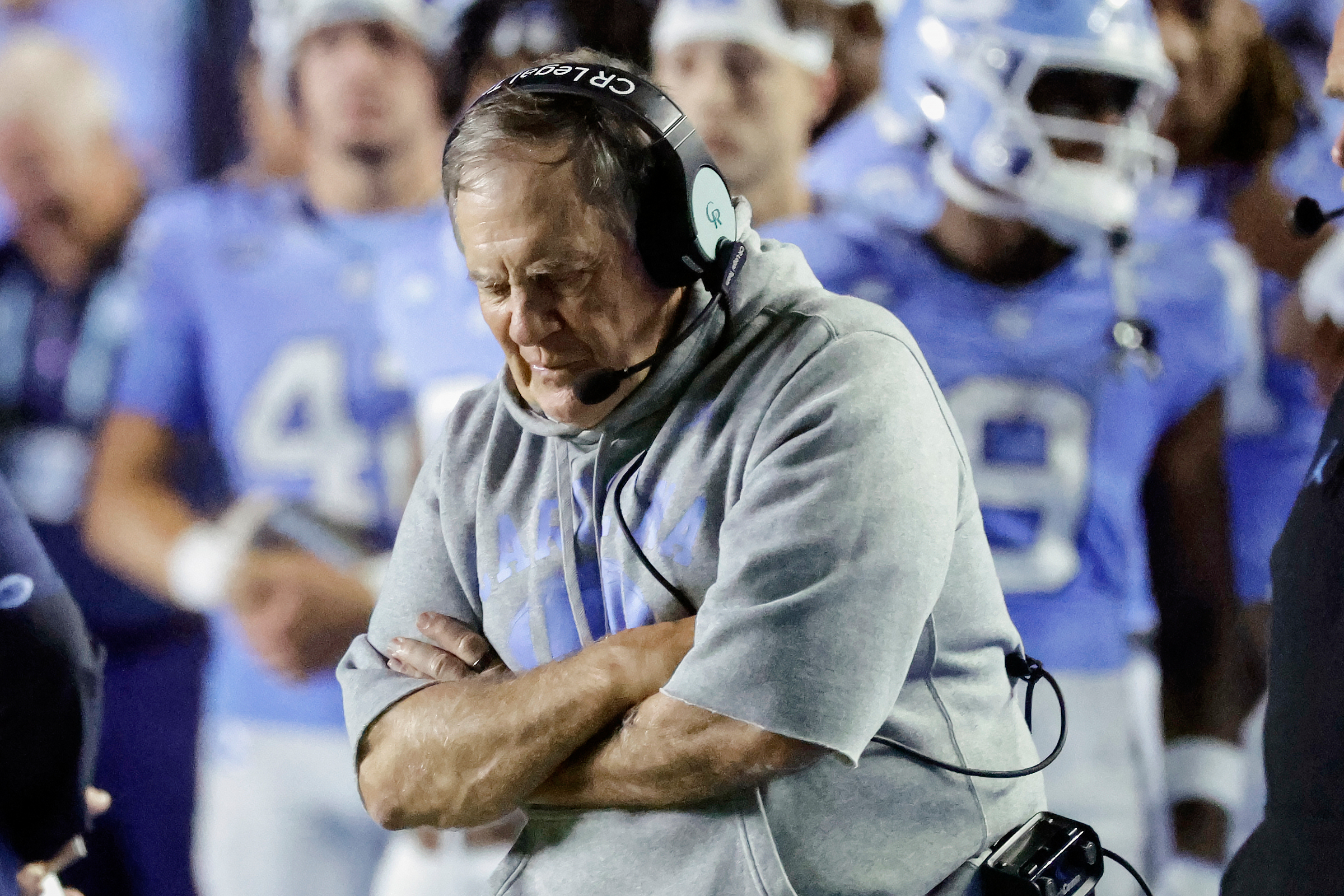
By AARON BEARD AP Sports Writer
CHAPEL HILL, N.C. (AP) — North Carolina’s opening-night show under Bill Belichick was a flop. The only good news is there’s little time to dwell on it.
Instead, Belichick’s first college team is hurtling straight from a 48-14 loss to TCU on Labor Day to Saturday’s kickoff at Charlotte, a brisk turnaround for a team with a long list of items on the repair list.
“You can’t particpate in a game like that and not feel like there’s some things you could’ve done better or you’d like to do over again,” Belichick said Wednesday. “Learn from those, move on and get ready for Charlotte. That’s all we can control.
“We need to learn some lessons from what happened in the TCU game. But at the same time, there’s nothing we can do about that one, it’s over with, and we need to move on.”
UNC turned to the 73-year-old coach who won six Super Bowls in leading the NFL’s New England Patriots in a bid to elevate a program beyond decades of also-ran status, including paying Belichick a guaranteed $10 million for each of his first three seasons.
Things began with a brief high point of a crisp season-opening touchdown drive and an immediate defensive stand. What followed was a gamelong descent that picked up speed on the way to a third-quarter crash that emptied out a packed Kenan Stadium well before the final period, all coming with the eyes of the college football world locked on Chapel Hill.
Belichick said the goal now was to move past the TCU loss “as fast as we can” and sort out what works, what doesn’t and what can improve quickly.
“I think as a coach you always try to do what’s best for your team, period, whatever that is,” Belichick said. “So you try to put players in the best position you can put them in. That’s your job as a coach.
“That’s what I’ve always tried to do, is give my players an opportunity to go out there and play well and do things they’re confident in doing and capable of doing. I’d say based on Monday night, I need to do a better job of that.”
By the end, UNC had given up the most points in an opener in program history. The Horned Frogs also posted the highest score allowed by a Belichick-coached team at any level going back to his 29-year run as an NFL head coach, the previous high being 47 points against the Buffalo Bills in a 2021 wild-card playoff game.
TCU scored 41 straight points after falling behind 7-0. That also created a rare scenario: there had been only four games in Belichick’s 511 NFL regular-season and playoff games that he had trailed by at least 34 points.
One of those was a 41-14 loss at Kansas City in September 2014, prompting Belichick’s famous “We’re on to Cincinnati” repeated response to reporters’ questions in a year that ended with the Pats winning title No. 4 under Belichick.
Belichick wasn’t nearly as terse Wednesday, giving thorough responses to questions about how the Tar Heels can move forward and what’s next. His players were following his lead, too.
“Man, we just move forward,” linebacker Khmori House said.
“Just turn that next page,” running back Caleb Hood said. “Put TCU to bed, that was last week, and control what we can control.”
Belichick shrugged off the question about whether his players could have wounded morale or confidence based on the jarring result, which stood in stark contrast to the buzz teeming through campus in the days leading up to the opener and that night in Kenan.
He could point to cleaning up problems that led to TCU scoring on a pick-six and a scoop-and-score for a pair of defensive touchdowns as examples of self-inflicted wounds. He could also point to a line of execution failures that compounded as TCU took over, from the Tar Heels managing just 139 yards on 42 plays (3.31 per-play average) after their game-opening TD drive to TCU finishing with 320 more yards (542) overall.
Rather, he pointed to the idea that every game is “an opportunity.” The test is finding out how this team responds to that message.
“We’ve spent a lot of time together and practiced a lot together, met together a lot, going back to February and January, whatever,” said Brian Belichick, Belichick’s son and UNC’s defensive backs/safeties coach.
“We’ve built up a lot of confidence in each other and trust in each other. The game ends up not going the way we want and I said it to some of the guys yesterday: ‘One night doesn’t define any of us.’”
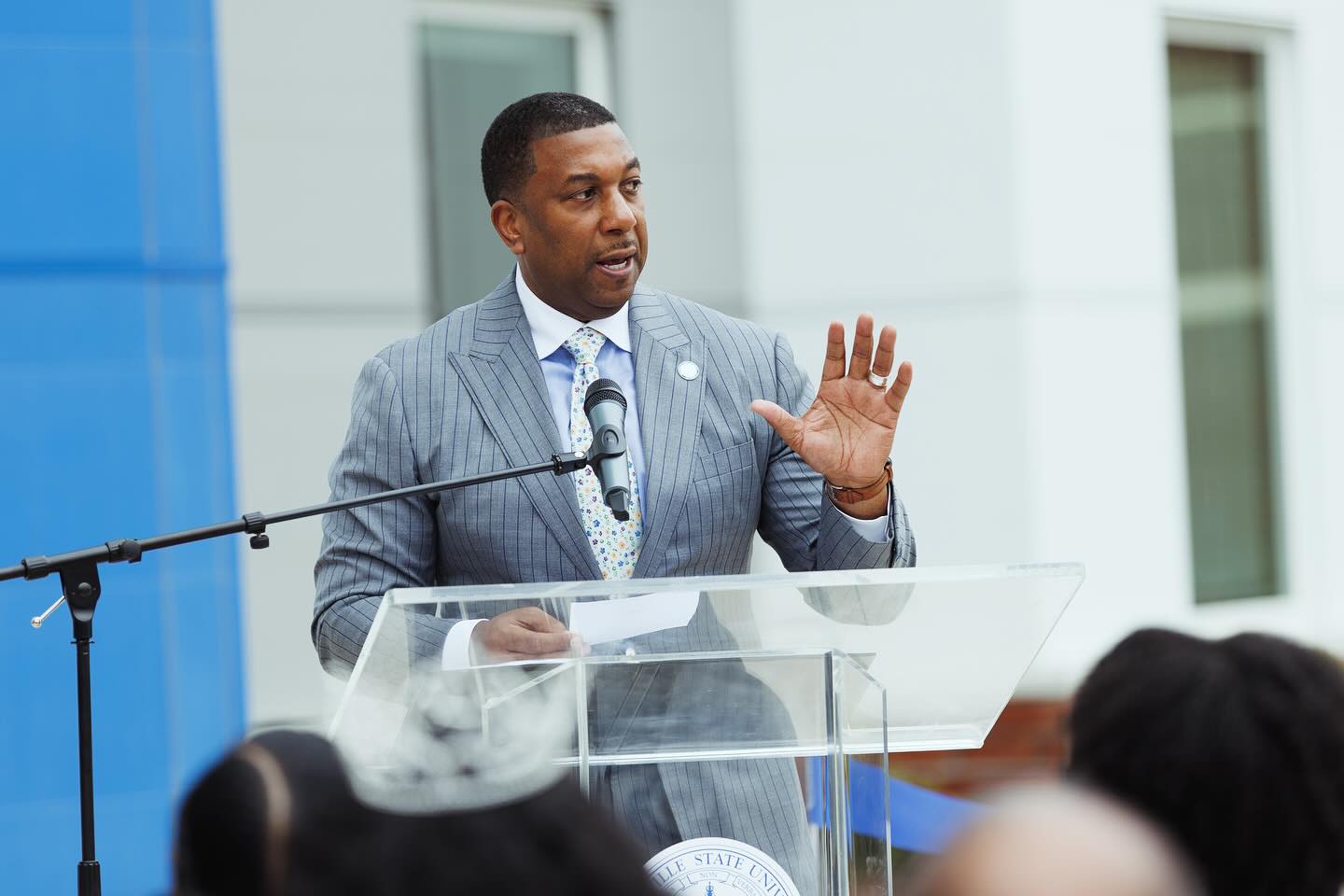
FAYETTEVILLE, N.C. (WPTF) – Fayetteville State University is experiencing another year of record enrollment while also posting some of the strongest academic gains in its history, school leaders announced Tuesday.
For the fourth straight year, FSU reached an all-time high enrollment with 7,628 students, surpassing last year’s record of 7,100 by more than 500. The freshman class is the largest since 2007 with 820 students, who arrived with an average GPA of 3.32.
The university also reported a 78% student retention rate, a 15-point increase since 2021.
“At Fayetteville State University, it’s more than just numbers, but the quality within our numbers,” Chancellor Darrell T. Allison said. He credited affordable tuition, high-demand programs and a focus on graduating students in four years or less.
Part of the growth has been fueled by FSU’s inclusion in the NC Promise program, which began covering the university in 2022. The initiative, backed by the General Assembly, lowers in-state tuition at participating institutions to $500 per semester and $2,500 for out-of-state students.
Provost Monica T. Leach said undergraduate programs in business administration, nursing and forensic science remain strong, while newer offerings in cybersecurity, sports and fitness management, computer science, construction project management and supply chain management are seeing notable growth.
The school also enrolled more than 2,500 military-affiliated students this year, the highest in its history, and continues to serve more than 1,100 transfer students annually.
Pamela Baldwin, vice chancellor for strategic enrollment and student success, said FSU’s efforts are focused on making education affordable and flexible. “Growth alone is never enough; what matters is what we do with it,” she said.
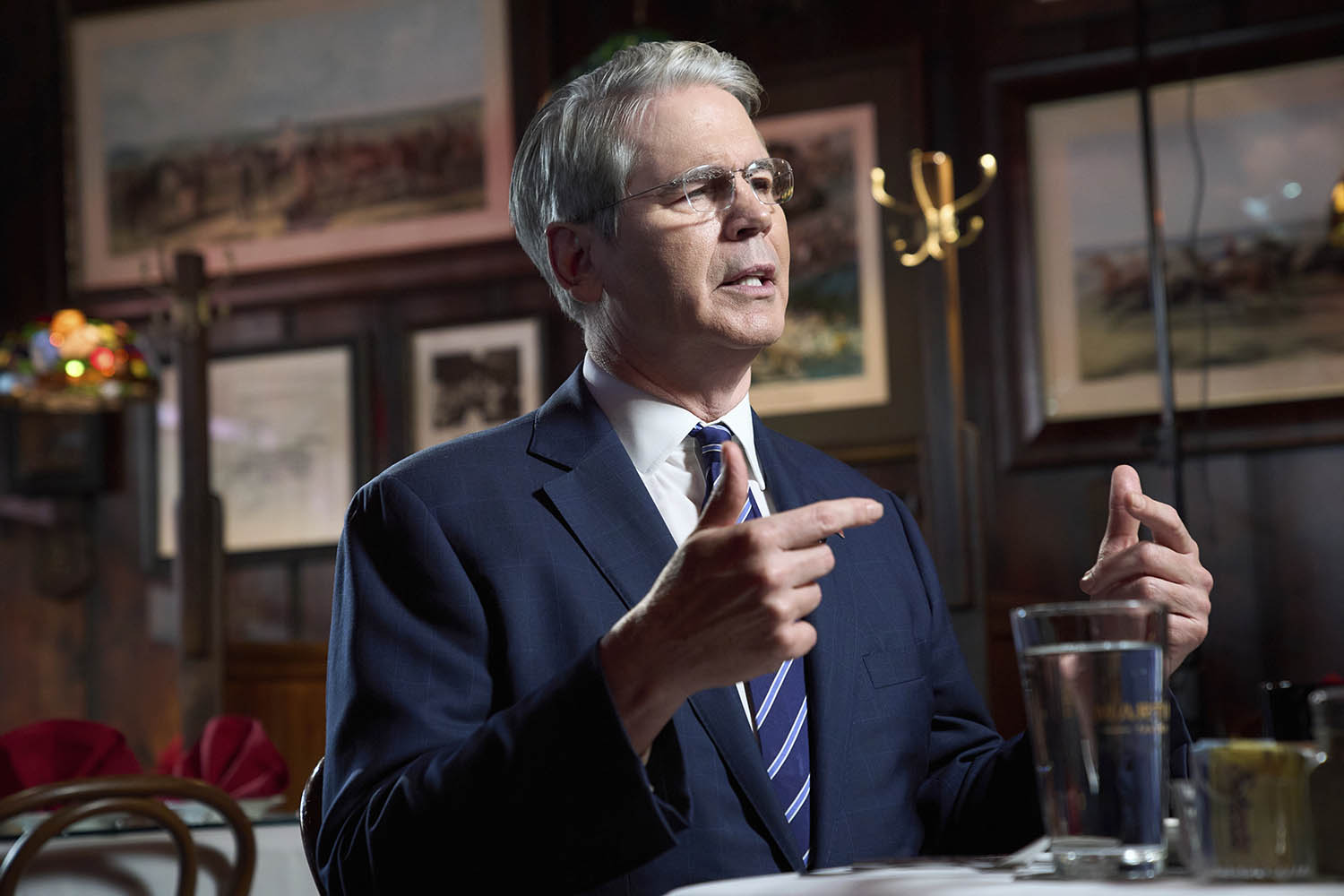
By FATIMA HUSSEIN Associated Press
WASHINGTON (AP) — Golf caddies, blackjack dealers and house painters are among the jobs covered under the Trump administration’s preliminary list of occupations not required to pay income tax on their tips under Republicans’ new tax cuts and spending bill.
A bit more unexpected? Podcasters and social media influencers will also be excluded from forking over a portion of their tips, according to the list released Tuesday by the Treasury Department.
The provision in the law signed by President Donald Trump in July eliminates federal income taxes on tips for people working in jobs that have traditionally received them. It’s temporary and runs from 2025 until 2028. It applies to people who make less than $160,000 in 2025.
The Yale Budget Lab estimates that there were roughly 4 million workers in tipped occupations in 2023, which amounts to roughly 2.5% of all jobs.
The administration was required to publish a list of qualifying occupations within 90 days of the bill’s signing. The full list of occupations is located on the Treasury Department website.
They are broken down into eight categories, including beverage and food service; entertainment and events; hospitality and guest services; home services; personal services; personal appearance and wellness; recreation and instruction; and transportation and delivery.
Among other jobs exempted from tax on tips are sommeliers, cocktail waiters, pastry chefs, cake bakers, bingo workers, club dancers, DJs, clowns, streamers, online video creators, ushers, maids, gardeners, electricians, house cleaners, tow truck drivers, wedding planners, personal care aides, tutors, au pairs, massage therapists, yoga instructors, cobblers, skydiving pilots, ski instructors, parking garage attendants, delivery drivers and movers.
A report from the Budget Lab shows that the effects of the law would be small, given that tipped workers tend to be lower income. More than 37% of tipped workers, or over one third, earned income low enough that they faced no federal income tax in 2022.
“The larger and far more uncertain effect would stem from behavioral changes incentivized by the bill, such as substitution into tipped employment and tipped income, which would increase the bill’s overall cost,” states the report, which was written by Ernie Tedeschi, the director of economics at the Budget Lab.
Congressional budget analysts project the “No Tax on Tips” provision would increase the deficit by $40 billion through 2028. The nonpartisan Joint Committee on Taxation estimated in June that the tips deduction will cost $32 billion over 10 years.
Only tips reported to the employer and noted on a worker’s W-2, their end-of-year tax summary, will qualify. Payroll taxes, which pay for Social Security and Medicare, would still be collected along with state and local taxes.
Polling shows Americans have panned the big bill. Half U.S. adults expect the new tax law will help the rich, according to the poll from The Associated Press-NORC Center for Public Affairs Research. Most — about 6 in 10 — think it will do more to hurt than help low-income people.

By MATT O’BRIEN AP Technology Writer
Artificial intelligence chatbot makers OpenAI and Meta say they are adjusting how their chatbots respond to teenagers asking questions about suicide or showing signs of mental and emotional distress.
OpenAI, maker of ChatGPT, said Tuesday it is preparing to roll out new controls enabling parents to link their accounts to their teen’s account.
Parents can choose which features to disable and “receive notifications when the system detects their teen is in a moment of acute distress,” according to a company blog post that says the changes will go into effect this fall.
Regardless of a user’s age, the company says its chatbots will attempt to redirect the most distressing conversations to more capable AI models that can provide a better response.
EDITOR’S NOTE — This story includes discussion of suicide. If you or someone you know needs help, the national suicide and crisis lifeline in the U.S. is available by calling or texting 988.
The announcement comes a week after the parents of 16-year-old Adam Raine sued OpenAI and its CEO Sam Altman, alleging that ChatGPT coached the California boy in planning and taking his own life earlier this year.
Jay Edelson, the family’s attorney, on Tuesday described the OpenAI announcement as “vague promises to do better” and “nothing more than OpenAI’s crisis management team trying to change the subject.”
Altman “should either unequivocally say that he believes ChatGPT is safe or immediately pull it from the market,” Edelson said.
Meta, the parent company of Instagram, Facebook and WhatsApp, also said it is now blocking its chatbots from talking with teens about self-harm, suicide, disordered eating and inappropriate romantic conversations, and instead directs them to expert resources. Meta already offers parental controls on teen accounts.
A study published last week in the medical journal Psychiatric Services found inconsistencies in how three popular artificial intelligence chatbots responded to queries about suicide.
The study by researchers at the RAND Corporation found a need for “further refinement” in ChatGPT, Google’s Gemini and Anthropic’s Claude. The researchers did not study Meta’s chatbots.
The study’s lead author, Ryan McBain, said Tuesday that “it’s encouraging to see OpenAI and Meta introducing features like parental controls and routing sensitive conversations to more capable models, but these are incremental steps.”
“Without independent safety benchmarks, clinical testing, and enforceable standards, we’re still relying on companies to self-regulate in a space where the risks for teenagers are uniquely high,” said McBain, a senior policy researcher at RAND and assistant professor at Harvard University’s medical school.

By MATT O’BRIEN AP Technology Writer
Artificial intelligence chatbot makers OpenAI and Meta say they are adjusting how their chatbots respond to teenagers asking questions about suicide or showing signs of mental and emotional distress.
OpenAI, maker of ChatGPT, said Tuesday it is preparing to roll out new controls enabling parents to link their accounts to their teen’s account.
Parents can choose which features to disable and “receive notifications when the system detects their teen is in a moment of acute distress,” according to a company blog post that says the changes will go into effect this fall.
Regardless of a user’s age, the company says its chatbots will attempt to redirect the most distressing conversations to more capable AI models that can provide a better response.
EDITOR’S NOTE — This story includes discussion of suicide. If you or someone you know needs help, the national suicide and crisis lifeline in the U.S. is available by calling or texting 988.
The announcement comes a week after the parents of 16-year-old Adam Raine sued OpenAI and its CEO Sam Altman, alleging that ChatGPT coached the California boy in planning and taking his own life earlier this year.
Jay Edelson, the family’s attorney, on Tuesday described the OpenAI announcement as “vague promises to do better” and “nothing more than OpenAI’s crisis management team trying to change the subject.”
Altman “should either unequivocally say that he believes ChatGPT is safe or immediately pull it from the market,” Edelson said.
Meta, the parent company of Instagram, Facebook and WhatsApp, also said it is now blocking its chatbots from talking with teens about self-harm, suicide, disordered eating and inappropriate romantic conversations, and instead directs them to expert resources. Meta already offers parental controls on teen accounts.
A study published last week in the medical journal Psychiatric Services found inconsistencies in how three popular artificial intelligence chatbots responded to queries about suicide.
The study by researchers at the RAND Corporation found a need for “further refinement” in ChatGPT, Google’s Gemini and Anthropic’s Claude. The researchers did not study Meta’s chatbots.
The study’s lead author, Ryan McBain, said Tuesday that “it’s encouraging to see OpenAI and Meta introducing features like parental controls and routing sensitive conversations to more capable models, but these are incremental steps.”
“Without independent safety benchmarks, clinical testing, and enforceable standards, we’re still relying on companies to self-regulate in a space where the risks for teenagers are uniquely high,” said McBain, a senior policy researcher at RAND and assistant professor at Harvard University’s medical school.

By MARIA SHERMAN AP Entertainment Writer
NEW YORK (AP) — Graham Greene, a trailblazing Indigenous actor whose long and successful career on the big and small screen included an Oscar nomination for his portrayal of Kicking Bird in “Dances with Wolves,” has died. He was 73.
Greene died Monday in Stratford, Ontario, after a long battle with “a lengthy illness,” Greene’s agent Michael Greene wrote in a statement provided to The Associated Press.
“He was a great man of morals ethics, character and will be eternally missed,” he wrote. “God bless you. You are finally free.”
Born in June 1952 in Ohsweken, Ontario, on Canada’s Six Nations Reserve, Greene worked as a draftsman, high steelworker, welder and carpenter before becoming an actor in the 1970s, beginning with the 1979 Canadian drama series “The Great Detective” and 1983 film “Running Brave.”
He is best known for his landmark role as Kicking Bird in the 1990 film “Dances with Wolves.” Greene’s 1991 Oscar nomination was one of 12 the movie earned. It won seven, including the top prize of best picture and best director for Kevin Costner. Greene also starred as Arlen Bitterbuck in the 1999 Tom Hanks project, “The Green Mile.”
Greene had a storied career, also appearing in 1994’s “Maverick,” 1995’s “Die Hard with a Vengeance,” 2012’s “The Twilight Saga: Breaking Dawn – Part 2” and 2017’s “Wind River.” He also acted in many critically acclaimed television programs, including “Reservation Dogs,”“1883,”“The Last of Us” and “Tulsa King.”
In 2000, Greene’s “Listen to the Storyteller” won a Grammy for best spoken word album for children. He also starred as elder Chief Rains Fall in the massively popular 2018 video game “Red Dead Redemption 2.”
He was also nominated for an Independent Spirit award for the 2002 film “Skins,” which documented life on the Lakota Sioux reservation.
Greene broke barriers for Native actors, demonstrating through his singular talent that Indigenous stories should and must be told by them.
Tributes poured in. “Graham Greene was one of the best to ever do it. He lived on the screen in an absolutely unparalleled way. He made everything he was in better. Funnier. Deeper. Memorable,” “Killers of the Flower Moon” star Lily Gladstone wrote on Instagram. “It’s hard to find any suitable words to express what his work meant, but his impact is unparalleled and expansive. I wish I could have met him. I probably would have thanked him.”
Costner posted on Instagram a scene from “Dances with Wolves” in which his and Greene’s characters are learning to communicate with one another. “He was a master at work and a wonderful human being,” Costner said of Greene’s work on the film. “I’m grateful to have been witness to this part of his lasting legacy.”
D’Pharaoh Woon-A-Tai, who played Indigenous teenager Bear Smallhill on “Reservation Dogs,” also expressed his appreciation. The FX comedy-drama smashed caricatures and stereotypes of Native Americans, who since the earliest days of film and TV have often played supporting roles or been portrayed as bloodthirsty killers standing in the way of white, westward expansion.
“You showed us it can be done and how to leave your mark. Trail blazing for every young native actor just dreaming,” Woon-A-Tai posted on Instagram. “Thank you for seeing something in me and sharing your knowledge throughout our friendship. Teaching me everything I know about this industry and more. I could never repay you. I’m grateful to have worked with you, gotten to know you, and call you Uncle.”
Greene is survived by his wife, Hilary Blackmore, and his daughter Lilly Lazare-Greene and son Talo.
___
This story first moved Sept. 2, 2025. It was updated Sept. 3, 2025, to update with a statement from his agent and update Greene’s survivors.

STRAFFAN, Ireland (AP) — Rory McIlroy watched Novak Djokovic handle boisterous spectators during a win at the U.S. Open and is ready to follow the tennis star’s lead at the Ryder Cup held in the United States this month.
A hostile and partisan crowd is set to greet McIlroy and the European team at Bethpage Black for the Sept. 26-28 matches as the Americans look to regain the cup two years after losing in Rome.
Djokovic had to deal with a similar environment during his U.S. Open quarterfinal match against home favorite Taylor Fritz and handled it well, even blowing kisses at one point to the fans rooting against him.
McIlroy liked what he saw from Djokovic, who gave Europe’s golfers a motivational speech in their team room before the victory at the 2023 Ryder Cup about dealing with high-pressure moments.
“He’s been the best at handling that,” McIlroy said Wednesday at the Irish Open, being staged at The K Club — the venue of the 2006 Ryder Cup — this week. “He’s had to deal with it his whole life, whether it’s playing against an American in New York or playing against Roger (Federer) or Rafa (Nadal).
“He came and spoke to us a little bit about that stuff last time in Rome. So maybe taking a leaf out of his book and channeling that energy the right way. But again, all we can do is control our reaction and our emotions to it. I think the less we play into it, the better it is for us.”
The experience of Rome should come in handy at Bethpage for a European team — finalized Monday — showing just one change two years on, with Rasmus Hojgaard qualifying automatically to be the only rookie in the 12-man roster.
McIlroy, who will be competing in his eighth Ryder Cup, used Robert MacIntrye — a rookie in Rome and now a regular contender for events on the PGA Tour — as an example to back up his belief that “pretty much every player on the team is more accomplished than what they were two years ago.” The Northern Irishman believes Europe has a “wonderful opportunity” to win a Ryder Cup on the road for the first time since 2012.
“They have a very strong team,” McIlroy said of the Americans. “They’re going to have a pretty raucous crowd on their side and on a golf course that a lot of them know pretty well from previous tournaments there.
“So make no mistake, we know we’re up against it and we know we’ve got a tall task on our hands, but I love the team that Luke has assembled.”
McIlroy branched out into acting this year, securing a small role in golf-related movie “Happy Gilmore 2.”
One reviewer feels he needs to work on those skills.
Shane Lowry, another member of Europe’s Ryder Cup team and also teeing it up at The K Club, was asked what he thought about his close friend’s performance.
“My daughter watched that the other day,” Lowry said with a smile, “and said Rory’s such a bad actor.”